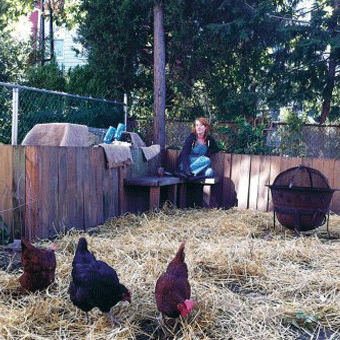Domesticity.

This entertaining book – Homeward Bound: Why Women Are Embracing the New Domesticity [1]
is an ethnography of the New Domesticity movement which the author sees as sweeping America. The main descriptive chapters provide a wealth of anecdotes and case-studies from Matchar’s interaction with individuals-mostly women-who have embraced one or more aspects of this movement.
Key chapters are devoted to the growing population of domestic bloggers sharing their reclaimed domesticity with sometimes lucrative results ; the new knitters and crocheters flocking to Etsy http://www.etsy.com/ the online craft marketplace; and the ‘femivores’ who pride themselves on cooking and eating what they have also produced.
Important sections are also dedicated to “attached parents” who wear their babies (as in “babywearing”);sleep with them (as in “co-sleeping”); never let them “cry-out”; and insist on home-schooling; and to the rise of “homesteading” which combines all of the above, and in principle though less often in practice has a clearer role for men.
Homesteading is seen by its proponents as a radical downshifting to sustainable living and the only way to go in face of the world’s current ills. Homesteaders grow their own soup, soap, and medicine and aim to live “off-grid” though a refrigerator seems to be peeking out in one of the interviews. Perhaps it is only being used as a cupboard. And the money-earning, memoir- writing homesteading bloggers have obviously found a happy accommodation with their urge for “slow living.”
Since many individuals embrace several dimensions of the new domesticity there is inevitably some overlap between these ethnographic chapters which could have been shortened, but the lively narrative draws the reader inexorably along. Fears that the author’s empathetic reportage will tilt into a sales-pitch are regularly quenched by her steely-eyed glimpses into Trouble in Paradise. Very few life-style bloggers, for example, make any money; and she is stoically unconvinced by re-useable toilet tissue.
The voices of the people Matchar talks to are vividly conveyed but she may want to consider being less vernacular in her own words? This would support the seriousness of her arguments and might prevent the text from dating so quickly. The use of “crunchy” and “crafty” particularly stand-out as needing a re-think. Isn’t “crunchy” best kept for their preferred food ? And “crafty” is not normally used to describe people who are skilled in craft (the Arts and Crafty Movement of the Late Victorian period?) though of course some of them may be crafty too. These are minor quibbles.
The descriptive heart of the book is bracketed by introductory chapters which consider other eras when home-making has exerted an unnatural pull; and an excellent final chapter offering some lessons learned from her investigation of the varied aspects of the new domesticity.
An obvious early parallel was chronicled by Betty Friedan in her 1963 classic “The Feminine Mystique” and perhaps Matchar could have made more of the contrasts and comparisons between then and now. Friedan showed quite persuasively though perhaps at too great a length how the media and other elements in society conspired to glorify home-making as women’s work when they became surplus to requirements in the workplace after men returned from the war.
The final chapter with its recommendations is a breathe of analytical fresh air where the author formulates five common sense responses to what she has learned noting first that the “essential” nature of the new domesticity places most of the burden of work squarely back on women’s martyred shoulders and so reverses the enfranchising of men which needs to go forward not backward.
Drawing together earlier arguments she states quite clearly that the financial independence of most of her interviewees is a myth as they are all reliant to some extent on their own salary or that of a partner or on family money. Becoming financially dependent is a retrograde, dangerous and unsustainable step for individuals and families and the new domesticity still has more than a tinge of middleclass privilege.
Last but not least this movement with its emphasis on self-reliance and going off-grid rather hypocritically claims to reject society instead of taking a responsibility for changing it. As she says “I hate to be an annoying liberal, who brings up how great things are in Sweden, but there you have it.” Strictly speaking she might be safer citing Norway these days, but the point is still very valid.
Don’t say: I’d go “off grid” if I didn’t have to write my food blog
Do say: New Domesticity looks pretty much like Old Domesticity with a bit more philosophical padding to make women feel better about it.
[1] By Emily Machtar published by Simon and Schuster May 2013 and reviewed at http://www.nyjournalofbooks.com/review/homeward-bound-why-women-are-embracing-new-domesticity